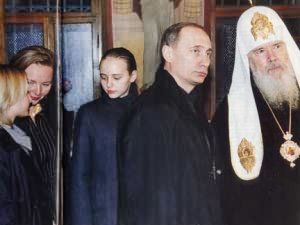Russian young generation believes in God and.....in Putin
 According to the latest research done by the Center of Sociology at the University of Socio-Political researches, Russian young generation does not trust either one of the country's power institutions, except the Church and Putin.
According to the latest research done by the Center of Sociology at the University of Socio-Political researches, Russian young generation does not trust either one of the country's power institutions, except the Church and Putin.
The research revealed that about 57,2% of surveyed young people trust Russian democracy and the remaining 48,1%-the Church. Russian State Duma, government, political parties, militia, neither one of these governmental organizations truly appeal to the young generation of Russians. Sociologists attempt to explain such phenomenon in the following way. They are certain that young people tend to form their vision of life's values based on the views of their predecessors of older generation. As far as the age group is concerned, it is president's character that appears to be most appealing to today's generation. Other political bodies appear to be corrupt and ineffective.
More than 2000 young people from 15 to 29 were surveyed. Last year's results were later compared to the ones of three years ago. As a result, it became obvious that today's young generation still does not possess much trust in regards to political bodies. Only 8,2% for instance believe in Russian political parties and only 15,8% trust State Duma. 20,1% trust Russian militia, 22% gave their votes for regional leaders and 24,%-for the Parliament of the Russian Federation. Such numbers as 48,1% for the Church and 57,25 for Putin appear to be quite sensational.
According to the researchers, modern Russian generation does not seem to be interested in politics at all. It is quite apolitical and does not believe in their ability to change anything in the system. At the same time, while comparing today's results with those of 1999, sociologists remark the overall increase of trust towards the country's authorities from 18,9% and up to 28,2%. By the same token, the overall amount of "nonbelievers" has been reduced from 57,7% to 46,4%. Such difference in opinions can be viewed especially well in regards to the President figure. Three years ago for instance, only 3,1 % of young people trusted Boris Yeltsin (Russia's former President). Today, the situation has undergone drastic changes.
According to sociologists, such high rating of “trusting” Putin individuals can be explained in a way that young people are often influenced by their parents and grandparents. RBC daily has mentioned earlier about the Romir Monitoring company.
“We have conducted a similar survey in December of last year,” stated a representative of the Romir Monitoring company Egene Krikin to RBC daily. The survey entitled “Which power authorities do you trust the most?” indicated that a lot depends on the fact whether a person lives in a family or alone. “Those youngsters, who lived with their parents, appeared to have acquired their parents' beliefs.”
The thing is, today Russia witnesses a leveling of age groups: various age groups tend to have the exact same opinions in regards to various subjects. Mrs. Krikina remarks for instance that moral values of younger and older generations have practically evened out. This can definitely be viewed as a positive occurrence. “This is very good, since a person needs to have some basis in order to form his/her personal opinion,” commented she. “One should not be afraid of this. It is important to trust your relatives. In the early 90s for instance, family conflicts occurred very often. Today, family fights no longer present a major problem. We all watch the same TV channels, go to the same supermarkets and the overall level of family conflicts has definitely decreased.”
Many specialists are also inclined to believe that such trust in the President Putin among the young generation can be seen as age-specific idealism and infantilism. “Idealism appears to be a rather characteristic trait among the young generation,” stated co-chairperson of the national strategy Council Joseph Diskin in his interview with RBC daily. “Those values associated with the head of the country and the Church are the most conservative and at the same time idealistic. While trusting the Church for instance, young people do not practice Christianity.” Diskin considers such attitude of the young generation to be mainly characteristic not so much of their trust in today's social institutions, but of their demonstration of certain life's principles. “Young generation tends to have more optimistic attitude towards the overall economic situation in the country,” stated Diskin. “Such factors as stability, opportunity to earn money, assurance of the country's development are all being associated with the President. Such attitude influences the degree of trust to the President figure as well as to the presidential institution at large.”
Interestingly, today's young generation refuses to participate in any political events. The generation demands, however, that a strong leader should govern the country. Young Russians like the idea of free entrepreneurship in the country along with the idea of having a closed society.

Anna Popova
Source: RBC daily
Subscribe to Pravda.Ru Telegram channel, Facebook, RSS!


